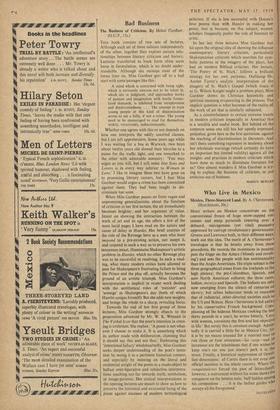Bad Business
The Business of Criticism. By Helen Gardner. (0.U.P., I 5s.) THIS book consists of two sets of lectures. Although each set of three subsists independently of the other, together they explore certain rela- tionships between literary criticism and history. Lectures transferred to book form often seem loose in formulation, which is no doubt under- standable. Although she recoups most of the losses later on, Miss Gardner gets off to a bad start with some passages like this: A mind which is concerned with being right,
which is nervously anxious not to be taken in, which sits in judgment, and approaches works of passion and imagination with neatly formu- lated demands, is inhibited from receptiveness and disinterestedness. . . . The attempt to train young people in this kind of discrimination seems to me a folly, if not a crime. The young need to be encouraged to read for themselves, widely, voraciously, indiscriminately.
Whether one agrees with this or not depends on how one interprets the oddly assorted clauses, but I am left apprehensive. Some years ago while I was waiting for a bus in Warwick, two boys about twelve years old slowed their bicycles to a pause for the traffic light, and one remarked to the other with admirable intensity : 'You may argue as you will, but I still insist that Sons and Lovers is in every way inferior to Women in Love.' I like to imagine these two have gone on to promising literary careers, but I fear Miss Gardner would argue a crime has been committed against them. They had been taught to dis- criminate too soon.
When Miss Gardner passes on from vague and unpromising generalisations about the function of criticism in her first lecture, the air immediately becomei brighter, and her argument of value. Intent on showing the interaction between the work of art and its age, she offers a few of the most lucid pages 1 have read on the nature and cause of delay in Hamlet. Her brief analysis of the role of the Revenge hero as a man who must respond to a pre-existing action, not incept it, and respond in such a way as to preserve his own Innocence intact, illuminates Shakespeare's artistic problem in Hamlet, which no other Revenge play was to be successful in resolving. In such a read- ing, what many modern critics have allowed to pass for Shakespeare's frustrating failure to bring the Prince and the play off, actually becomes the ground of an artistic triumph. Miss Gardner's interpretation is implicit in recent work dealing with the antithetical roles of 'minister' and 'scourge' in Shakespeare's day (both of which Hamlet assigns himself). But she adds new insights, and brings the whole to a sharp, revealing focus.
Towards the end of her first group of three lectures, Miss Gardner strongly objects to the proposition advanced by Mr. W. K. Wimsatt in The Verbal Icon that the poet's intention in creat- ing is irrelevant. She replies: 'A poem is not what- ever I choose to make it. It is something which its author made with deliberation, choosing that it should say this and not that.' Embracing this 'intentional fallacy' wholeheartedly, Miss Gardner seeks deeper understanding of the poet's inten- tion by seeing it in a pertinent historical context, and especially by insisting on the literal and existential weight of the poem as a made-object to ballast over-figurative and subjective interpreta- tions reaching too far towards myth, symbolism, or image-patterns. Her critical interpretations in the opening lectures are meant to show us how to preserve the historical and existential being of the poem against excesses of modern technological criticism. If she is less successful with Donne's love poems than with Hamlet in making her point, that is because, on this subject, women scholars frequently prefer the role of feminist to critic.
In her last three lectures Miss Gardner has hit upon the original idea of showing the influence contemporary literary criticism, particularly Shakespearian criticism which searches for sym- bolic patterns in the imagery of the plays, has had on modern Biblical criticism. Her lecture, 'The Poetry of St. Mark, follows a brilliant strategy for her own purposes. Outlining. Dr. Austen Farrer's analytic interpretation of the imagery of St. Mark's Gospel (which treats it as G. Wilson Knight might a problem play), Miss Gardner shows its Christian historicity and spiritual meaning evaporating in the process. The implicit question is what becomes of the reality of the work of art that is similarly subjected.
As a counterbalance to certain extreme trends in modern criticism (especially in America) this is a sensible and useful book. But behind all the common sense one still has her openly expressed prejudice, given here in the first quotation, against the teaching of discrimination in literature. And isn't there something regressive in tendency about her wholesale warnings (which certainly do have an important but limited validity) against all the insights and practices in modern criticism which have done so much to illuminate literature for us? One almost wonders if Miss Gardner is try- ing to explain the business of criticism, or put criticism out of business.
MARIUS BEWLEY


































 Previous page
Previous page